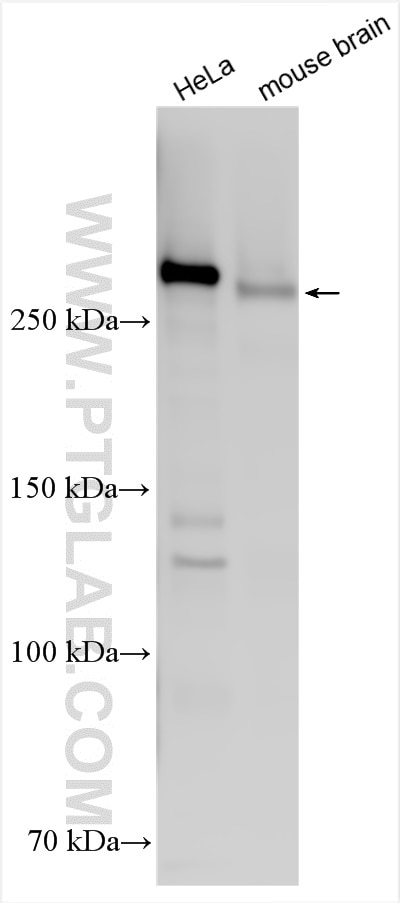CSPG4 Polyclonal antibody
CSPG4 Polyclonal Antibody for WB, ELISA
Host / Isotype
Rabbit / IgG
Reactivity
human, mouse
Applications
WB, ELISA
Conjugate
Unconjugated
Cat no : 31623-1-AP
Synonyms
Validation Data Gallery
Tested Applications
| Positive WB detected in | HeLa cells, mouse brain tissue |
Recommended dilution
| Application | Dilution |
|---|---|
| Western Blot (WB) | WB : 1:500-1:1000 |
| It is recommended that this reagent should be titrated in each testing system to obtain optimal results. | |
| Sample-dependent, Check data in validation data gallery. | |
Product Information
31623-1-AP targets CSPG4 in WB, ELISA applications and shows reactivity with human, mouse samples.
| Tested Reactivity | human, mouse |
| Host / Isotype | Rabbit / IgG |
| Class | Polyclonal |
| Type | Antibody |
| Immunogen | Recombinant protein 相同性解析による交差性が予測される生物種 |
| Full Name | chondroitin sulfate proteoglycan 4 |
| Calculated molecular weight | 251kd |
| Observed molecular weight | 250-300 kDa |
| GenBank accession number | NM_001897.5 |
| Gene symbol | CSPG4 |
| Gene ID (NCBI) | 1464 |
| RRID | AB_3670052 |
| Conjugate | Unconjugated |
| Form | Liquid |
| Purification Method | Antigen affinity Purification |
| Storage Buffer | PBS with 0.02% sodium azide and 50% glycerol pH 7.3. |
| Storage Conditions | Store at -20°C. Stable for one year after shipment. Aliquoting is unnecessary for -20oC storage. |
Background Information
CSPG4 is a proteoglycan that plays a role in cell proliferation and migration, stimulates endothelial cell motility during microvascular morphogenesis and may also inhibit neurite outgrowth and growth cone collapse during axon regeneration. CSPG4 is expressed on more than 90% of human melanoma tissues and cultured cells. It is a target of specific diagnosis and immunotherapy with antiidiotypic antibodies due, in part, to its roles in growth control, adhesion, cell-substratum interactions, and cell-cell contacts (PMID: 10587647; 11278606).
Protocols
| Product Specific Protocols | |
|---|---|
| WB protocol for CSPG4 antibody 31623-1-AP | Download protocol |
| Standard Protocols | |
|---|---|
| Click here to view our Standard Protocols |


